Page revised 18 January
2004
EDWARD LAW
ARMS, CRESTS &
MONOGRAMS
The London firm of Jenner & Knewstub, heraldic stationers, die-sinkers,
engravers and illustrators, who have been noted in business
between 1868 and 1889, 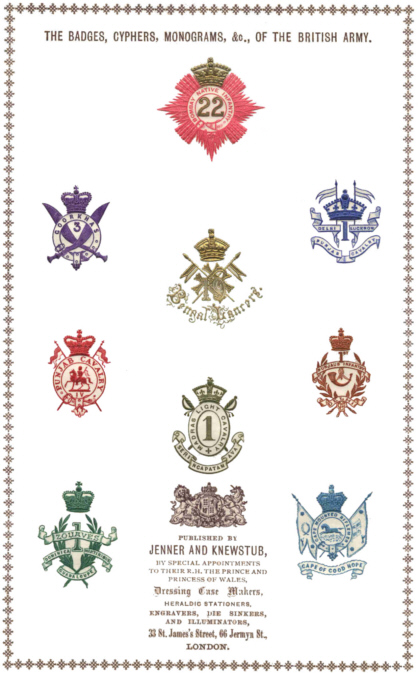 produced crests of outstanding quality,
including stationery for the Russian Imperial family. Illustrated
is a sheet which may have been produced as a sample of their
output for prospective customers, or for sale to discerning
collectors. A search among the records of the Patent Office has
located only one submission relating to crests: it was entered by
Fabian James Knewstub, one of the principals of the firm, in
April 1869.
produced crests of outstanding quality,
including stationery for the Russian Imperial family. Illustrated
is a sheet which may have been produced as a sample of their
output for prospective customers, or for sale to discerning
collectors. A search among the records of the Patent Office has
located only one submission relating to crests: it was entered by
Fabian James Knewstub, one of the principals of the firm, in
April 1869.
Among the author's
collection of crest and monogram albums is a rather battered
album containing a collection of outstanding quality, which it is
believed may be largely Jenner & Knewstub material. One page
in this album carries eleven monograms, three of them crested,
one crest and two armorials. On the facing page are pasted eleven
signatures, six of which carry the initials RA. Identification of
the monograms which were not accompanied by a signature has been
effected through the good offices of Mark Pomeroy, The Royal
Academy's archivist, and study of the membership list in The
Royal Academy1.
A search on the internet
found an index2, created at City University, London,
of titles of books reviewed in the Athenaeum, which
included a reference to a publication titled Arms, Crests,
Monograms and Autographs of the Members of the Royal Academy. It
seemed clear that this work, reviewed in 1871, related in some
way to the set in the album, the production of which had been
tentatively dated to the period 1866-1871.
The review3 is
informative:
Arms; Crests; Monograms and Autographs
of the Members of the Royal Academy. Part I. (Jenner
& Knewstub.)
This book has a special interest, as
affording an opportunity of gauging the progress of a
very popular taste of the day. Of the armorial bearings
it may be said that some R.A.s are conspicuous by having
none, so far as this publication informs us. Most of them
display crests, which, of course, presume the existence
of arms; Sir F. Grant, for example, is distinguished by
the splendour of his heraldic achievements. The greater
number of the "Monograms" -such, for instance,
as the capitally-combined "G.E.S." of Mr.
Street- are really ciphers, and not monograms at all; on
the other hand, Mr. Richard Redgrave joins his two
'R's" back to back and triumphs as a monogrammatical
artist. To many the autographs will supply a good deal of
amusement. We can attest the fidelity of the
reproductions of handwritings, which are too frequently
anything but caligraphic.
The monograms (not to be
so pedantic as George Frederick Stephens, author of the above
review) and the facsimile signatures are:
| John Henry
Robinson |
|
 |
| Richard J Lane |
 |
 |
| William Calder
Marshall |
 |
 |
| Henry Le Jeune |
|
 |
| Edward William
Cooke |
 |
 |
| Edwin Landseer |
|
 |
| Charles West Cope |
 |
 |
| Robert Redgrave |
 |
 |
| William Charles
Thomas Dobson |
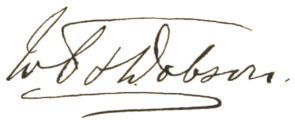 |
 |
| George Edmund
Street |
 |
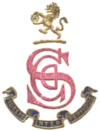 |
| John Henry Foley |
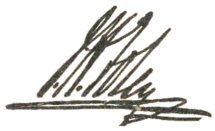 |
 |
| Thomas Sidney
Cooper |
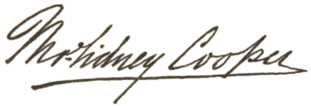 |
 |
The lone crest, by the
placings of the signature in my album, would appear to be that of
Thomas Sidney Cooper.
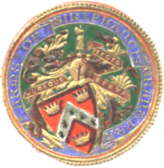 The armorials; which are beautifully
executed in roundels, are of two Presidents of the Royal Academy:
Sir Francis Grant and (Sir) John Everett Millais.
The armorials; which are beautifully
executed in roundels, are of two Presidents of the Royal Academy:
Sir Francis Grant and (Sir) John Everett Millais.
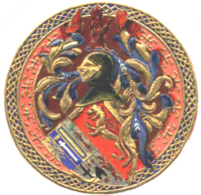
The ascription of the
'book' to Jenner & Knewstub is helpful, though it does raise
the question of exactly what form the publication took: it is
believed that it may have been no more than one or two sheets.
The review also begs the question 'were there further parts?'

There is no record of a
copy of the published work being held in either the archives or
the library of the Royal Academy, which is rather unfortunate. It
does not appear in the on-line indexes of the British Library,
and extensive searches by the staff of the National Art Library
have failed to locate a copy. Truly the location of The
Athenaeum index on the internet was most fortuitous. (See
post script.)
As might be expected, the
arts are represented in collections of Victorian crests. Among
the institutions which have been noted are the Royal Academy
itself; the Goupil  Gallery; the Art-Union of London at
444 West Strand; the St James Gallery of Art; Old Bond Street
Gallery, 25 Old Bond Street; and the Royal Institute of Painters
in Water Colours, the latter appearing in two versions, the
second carrying the additional title New Society of Painters in
Water Colours. The album mentioned above contains a stylish crest
Gallery; the Art-Union of London at
444 West Strand; the St James Gallery of Art; Old Bond Street
Gallery, 25 Old Bond Street; and the Royal Institute of Painters
in Water Colours, the latter appearing in two versions, the
second carrying the additional title New Society of Painters in
Water Colours. The album mentioned above contains a stylish crest
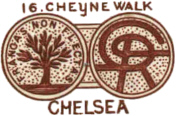 incorporating the initials DGR and the
address 16, Cheyne Walk, Chelsea, which, we are informed in a
pencil note, was Dante Gabriel Rossetti's own design. A crest
bearing the Royal arms and the legend Royal Academy Gosport is
somewhat puzzling until a connection is made with the Royal Naval
Academy!
incorporating the initials DGR and the
address 16, Cheyne Walk, Chelsea, which, we are informed in a
pencil note, was Dante Gabriel Rossetti's own design. A crest
bearing the Royal arms and the legend Royal Academy Gosport is
somewhat puzzling until a connection is made with the Royal Naval
Academy!
The illustrations
accompanying this article will indicate the attraction which
these beautifully produced crests held for Victorian youth. If
such material had been readily available through the twentieth
century the pastime of crest collecting would not have passed
into obscurity. The author was delighted to find in
correspondence with the Royal Academy that, as befits such a
body, their letterhead detail, including the Royal arms,
continues to be executed in coloured relief (See Modern).
POST SCRIPT. Rechecking
the on-line catalogue of the Bodleian Library, Oxford, which
holds one of the few public collections of crest albums, I
encountered an entry: Arms, Crests, Monograms
and Autographs of the members of the Royal Academy of Arts
[1872]. Bookstack 2194 e.9: clearly a copy of the elusive
'book'. A photocopy of the work was obtained which shows it to be
a cover containing four sheets sewn into it. The cover carries
the title already quoted with the publishers' detail: (Published
by permission.) Jenner & Knewstub, to the Queen, 33, St.
James's Street, and 66, Jermyn Street, and Simpkin, Marshall,
& Co., London. The four inner pages all carry the heading: Arms, Crests, Monograms, &c. OF THE MEMBERS OF THE ROYAL ACADEMY. (Published by permission.), and at the foot:
Additionally the front
cover gives the price: Part I. Illuminated, 10s. Ditto. Coloured
4s., and a statement that it had been Entered at Stationers'
Hall. It is interesting to find the work issued in two qualities.
The Bodleian's copy is coloured, the cut crests in my album are
illuminated, which reinforces my belief that the album was
created by someone with access to Jenner & Knewstub material.
It is unlikely that anyone would cut up an attractive booklet
which had cost ten shillings, a not insubstantial sum in the
1870s.
The four sheets in the
booklet contain 22 arms, crests, monograms etc. all with the
member's signature beneath. My tentative ascription of the crest
to Thomas Sidney Cooper proved to be correct. The eight
additional crests etc. in the booklet, and the signatures of the
members to whom these relate, and the three which are missing in
the schedule above are given here.
 |
Alfred Elmore, RA |
Edward
Armitage, ARA
|
 |
 |
John Prescott
Knight, ARA |
George
Thomas Doo, RA
|
 |
 |
Sir Edwin Henry Landseer, RA |
Philip
Hardwick, RA
|
 |
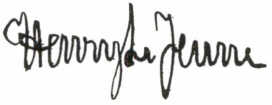 |
Henry Le Jeune, ARA |
Sydney
Smirke, RA
|
 |
 |
John Henry Robinson, RA |
Henry Nelson
O'Neil, ARA
|
 |
 |
George Gilbert Scott, RA |
REFERENCES.
| 1 |
W R M Lamb The Royal
Academy: A short history of its foundation and
development to the present day, London
1935. |
| 2 |
The Athenaeum Index of Reviews and Reviewers:
1830-1870, http://web.soi.city.ac.uk/~asp/v2/home.html |
| 3 |
The Athenaeum, No 2290, 16 September 1871,
p374. |
Return to HOME
or to TOPICS PAGE
 produced crests of outstanding quality,
including stationery for the Russian Imperial family. Illustrated
is a sheet which may have been produced as a sample of their
output for prospective customers, or for sale to discerning
collectors. A search among the records of the Patent Office has
located only one submission relating to crests: it was entered by
Fabian James Knewstub, one of the principals of the firm, in
April 1869.
produced crests of outstanding quality,
including stationery for the Russian Imperial family. Illustrated
is a sheet which may have been produced as a sample of their
output for prospective customers, or for sale to discerning
collectors. A search among the records of the Patent Office has
located only one submission relating to crests: it was entered by
Fabian James Knewstub, one of the principals of the firm, in
April 1869.




















 The armorials; which are beautifully
executed in roundels, are of two Presidents of the Royal Academy:
Sir Francis Grant and (Sir) John Everett Millais.
The armorials; which are beautifully
executed in roundels, are of two Presidents of the Royal Academy:
Sir Francis Grant and (Sir) John Everett Millais.


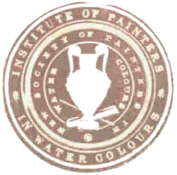
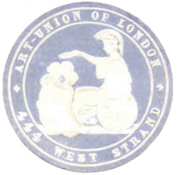
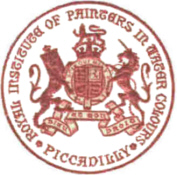
 Gallery; the Art-Union of London at
444 West Strand; the St James Gallery of Art; Old Bond Street
Gallery, 25 Old Bond Street; and the Royal Institute of Painters
in Water Colours, the latter appearing in two versions, the
second carrying the additional title New Society of Painters in
Water Colours. The album mentioned above contains a stylish crest
Gallery; the Art-Union of London at
444 West Strand; the St James Gallery of Art; Old Bond Street
Gallery, 25 Old Bond Street; and the Royal Institute of Painters
in Water Colours, the latter appearing in two versions, the
second carrying the additional title New Society of Painters in
Water Colours. The album mentioned above contains a stylish crest
 incorporating the initials DGR and the
address 16, Cheyne Walk, Chelsea, which, we are informed in a
pencil note, was Dante Gabriel Rossetti's own design. A crest
bearing the Royal arms and the legend Royal Academy Gosport is
somewhat puzzling until a connection is made with the Royal Naval
Academy!
incorporating the initials DGR and the
address 16, Cheyne Walk, Chelsea, which, we are informed in a
pencil note, was Dante Gabriel Rossetti's own design. A crest
bearing the Royal arms and the legend Royal Academy Gosport is
somewhat puzzling until a connection is made with the Royal Naval
Academy!










